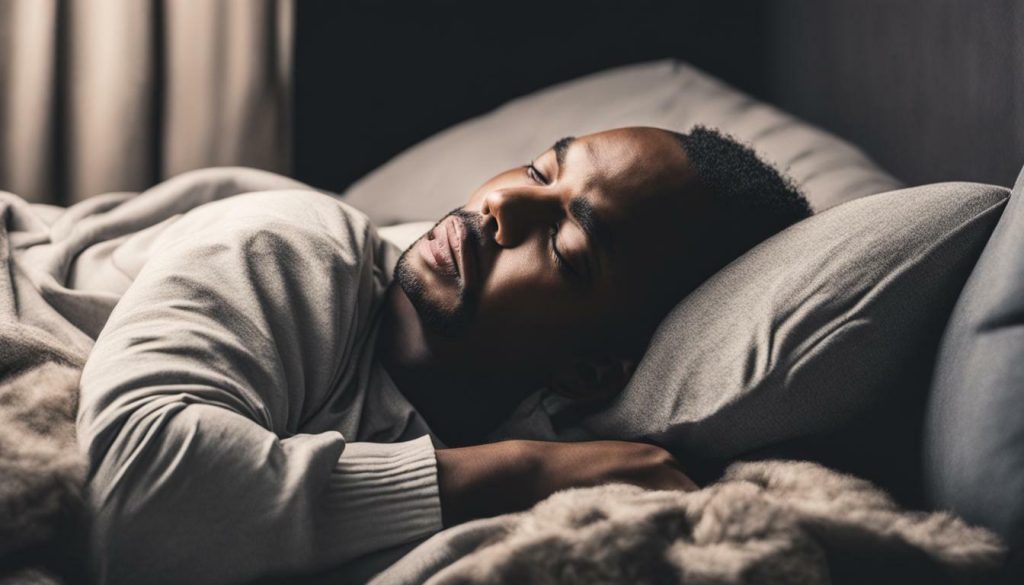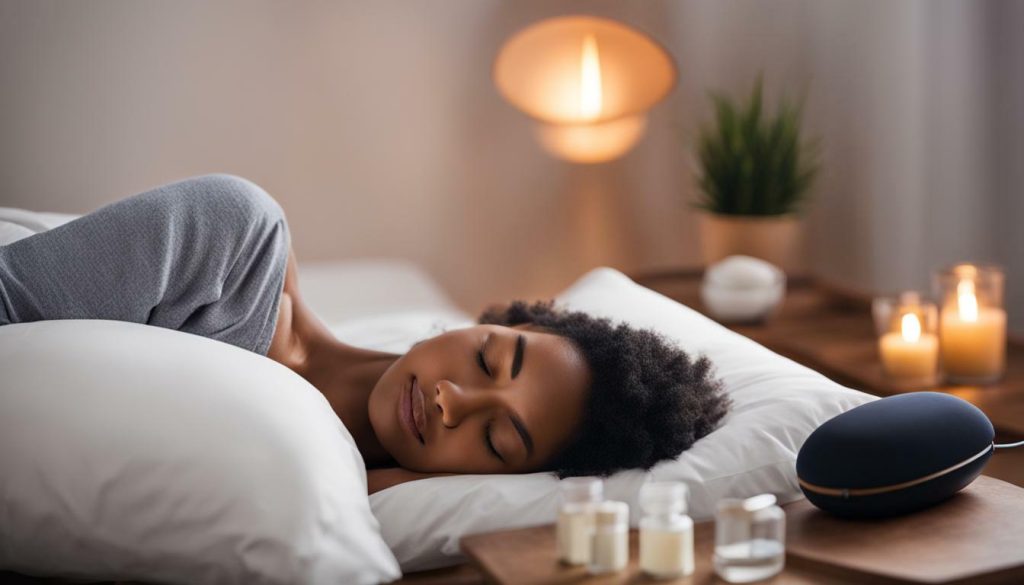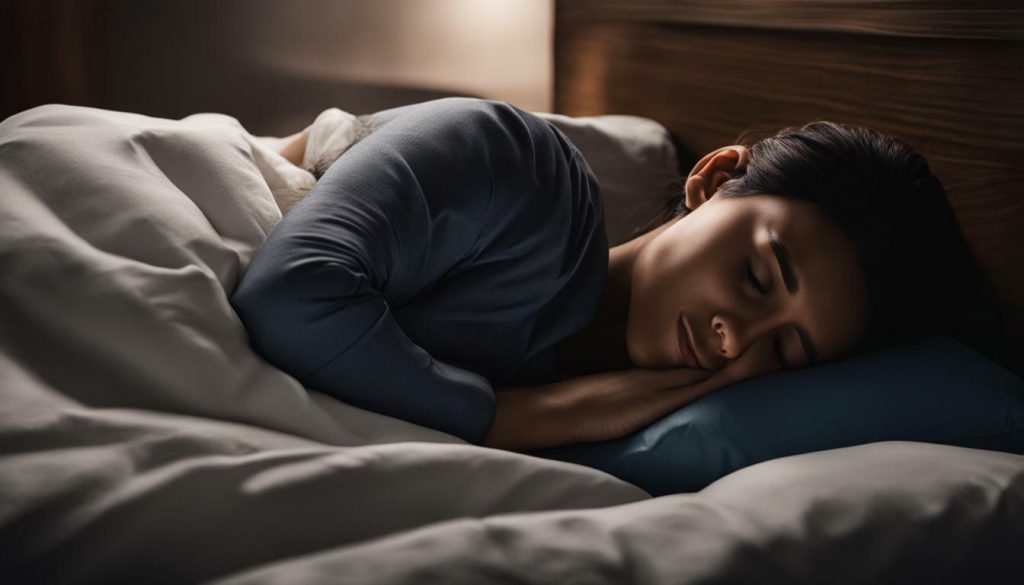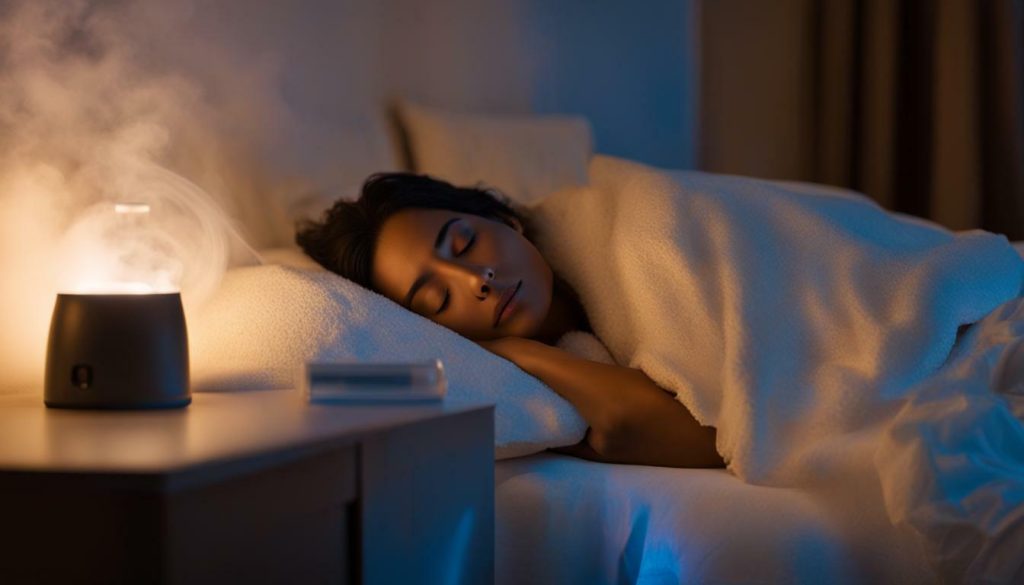
Dealing with an ear infection can make getting a good night’s sleep challenging. However, various strategies can help alleviate discomfort and promote better sleep. By implementing these tips, you can improve your sleep quality and find relief from the symptoms of an ear infection.
- Elevate your head to aid in fluid drainage and relieve pressure and pain
- Consult a doctor before taking over-the-counter pain relievers
- Promote natural drainage and reduce pain by sipping water or doing swallowing exercises
- Switch sleep positions regularly to relieve pressure on the infected ear
- Manage allergies and congestion with decongestants or antihistamines
- Seek professional guidance if your ear infection significantly impacts your ability to sleep
- Create a comfortable sleep environment with supportive pillows and proper temperature and lighting
Elevate Your Head for Better Sleep with an Ear Infection
Elevating your head is an effective way to sleep better with an ear infection. Raising your head while sleeping can help promote fluid drainage from the affected ear and reduce pressure and pain. Elevating your head can also improve blood circulation to the area, aiding healing.
To elevate your head, you can use an extra pillow or prop up the head of your bed with blocks or risers. This slight incline can significantly affect your comfort levels during sleep. It’s important to ensure that your head remains elevated throughout the night, so try using pillows that provide adequate support and won’t easily flatten.

Additionally, sleeping on the side of your unaffected ear can further alleviate pressure on the infected ear. This position can help create a more comfortable sleeping environment, allowing you to rest better. Experiment with different sleeping positions to find the one that provides the most relief and support for your ear infection.
Quotes:
Elevating your head can significantly improve sleep comfort when dealing with an ear infection.” – Dr. Sarah Johnson, ENT Specialist
Remember, while elevating your head can help with sleep comfort, it is crucial to consult with a healthcare professional for a proper diagnosis and treatment plan for your ear infection. They can provide personalized advice based on your specific situation and help address any underlying causes contributing to the infection.
Elevating your head during sleep can enhance your comfort levels and promote better sleep despite having an ear infection. Combine this approach with other techniques, such as managing allergies and creating a sleep-friendly environment, to optimize your sleep experience and facilitate healing.
| Benefits of Elevating Your Head for Sleep with an Ear Infection |
|---|
| Drains fluid from the ear |
| Reduces pressure and pain |
| Improves blood circulation |
| Creates a more comfortable sleeping environment |
Over-the-Counter Pain Relievers for Ear Infection Sleep Relief:
Over-the-counter pain relievers can provide relief and improve sleep quality when dealing with an ear infection. These medications, such as paracetamol or ibuprofen, can help alleviate the pain and discomfort associated with an infected ear, allowing for a more restful sleep.

However, it is important to note that before taking any medication, especially for children or individuals with underlying health conditions, it is essential to consult a doctor. They can provide guidance and ensure that the chosen pain relievers are suitable and safe for use.
In addition to over-the-counter pain relievers, there are other strategies that can be employed to improve sleep comfort with an ear infection. These include elevating the head to aid in fluid drainage, switching sleep positions to relieve pressure on the infected ear, and managing allergies and congestion that may exacerbate symptoms. Sipping water or doing swallowing exercises can also help promote natural drainage and reduce pain during sleep.
In conclusion, when dealing with an ear infection, over-the-counter pain relievers can provide relief and improve sleep quality. However, it is crucial to consult a healthcare professional before taking any medications, especially for specific demographics. Implementing additional strategies like elevating the head, switching sleep positions, and managing allergies can further enhance sleep comfort and alleviate the symptoms associated with an ear infection.
Promote Natural Drainage and Reduce Pain During Sleep
There are natural methods you can try to promote better drainage and reduce pain when sleeping with an ear infection. These strategies can help alleviate discomfort and improve your chances of getting a good night’s sleep.
Firstly, sipping water throughout the day and doing swallowing exercises before bed can aid in promoting natural drainage. This can help clear any fluid buildup in the ear, reducing pain and pressure. Staying hydrated is important for overall health and can also help thin mucus, making it easier for your body to flush out any congestion.
In addition to promoting natural drainage, switching sleep positions can also provide relief. Try sleeping on the side of your unaffected ear to reduce pressure on the infected ear. This can help alleviate discomfort and promote better sleep. Regularly changing positions throughout the night can also prevent discomfort caused by prolonged pressure on one side.
Lastly, creating a comfortable sleep environment can contribute to better sleep quality. Use supportive pillows to elevate your head and ensure proper alignment of your ear. This can help with the drainage of fluid and reduce pain. Additionally, maintaining a cool, dark, and quiet sleeping environment can minimize any distractions and promote a more restful sleep.

| Natural Methods for Better Sleep with an Ear Infection |
|---|
| 1. Sip water throughout the day to promote natural drainage. |
| 2. Do swallowing exercises before bed to clear fluid buildup. |
| 3. Change sleep positions regularly, sleeping on the unaffected ear. |
| 4. Use supportive pillows to elevate your head and align your ear. |
| 5. Create a comfortable sleep environment with proper temperature and lighting. |
Switch Sleep Positions to Relieve Pressure on the Ear.
Changing your sleep positions can help alleviate pressure on the ear and improve sleep quality when dealing with an ear infection. Sleeping on the side of the unaffected ear can provide relief and prevent further discomfort. By distributing the weight more evenly and minimizing contact between the infected ear and the pillow, you can reduce pressure on the affected area. This can lead to a more restful sleep and alleviate any pain or discomfort caused by the infection.
In addition to sleeping on the unaffected side, you can try using supportive pillows to further relieve pressure on the ear. A contoured pillow or a pillow with a hole in the center can provide a more comfortable sleeping surface, minimizing contact with the affected ear. Alternatively, using a soft pillow or adding extra padding can help cushion the ear and reduce any direct pressure.
It’s important to note that finding the right sleep position may require some trial and error. Everyone’s body and comfort preferences are different, so it’s essential to listen to your own body and adjust accordingly. By experimenting with different sleep positions and pillows, you can find the most comfortable position that promotes better sleep while minimizing discomfort caused by the ear infection.
Remember, finding relief from an ear infection during sleep is crucial for overall well-being and healing. By switching sleep positions and using supportive pillows, you can better manage the pressure and discomfort associated with an ear infection and improve the quality of your sleep.

| Sleep Positions to Relieve Pressure on the Ear |
|---|
| Sleeping on the side of the unaffected ear |
| Using a contoured pillow or a pillow with a hole in the center |
| Using a soft pillow or adding extra padding |
Manage Allergies and Congestion for Better Sleep
Addressing allergies and congestion can help improve sleep quality and alleviate discomfort caused by an ear infection. Allergies can exacerbate the symptoms of an ear infection, increasing congestion and making it harder to breathe. By managing these issues, you can create a more conducive sleep environment and promote better rest.
One effective way to manage allergies is by using over-the-counter decongestants or antihistamines. These medications can help reduce nasal congestion, sneezing, and itching, making it easier to breathe and sleep. However, it’s important to follow the instructions and consult a healthcare professional if you have any underlying medical conditions or are unsure about the appropriate dosage.
In addition to medication, there are also natural remedies that can provide relief from allergies and congestion. Nasal saline rinses can help clear out nasal passages and alleviate congestion. You can easily make a saline solution at home using salt and warm water. Another option is using a humidifier or steam inhalation to add moisture to the air, reducing nasal dryness and congestion.
| Manage Allergies and Congestion for Better Sleep |
|---|
|
By incorporating these tips into your routine, you can effectively manage allergies and congestion, improving your sleep quality and minimizing the discomfort caused by an ear infection. Remember to consult a healthcare professional if your symptoms persist or worsen, as they can provide additional guidance and treatment options tailored to your specific needs.

If you find that your ear infection is severely impacting your sleep, it’s important to consult with a healthcare professional. They can provide the necessary guidance and treatment options to alleviate your discomfort and improve your quality of sleep.
There are various reasons why an ear infection can significantly disrupt your sleep. The pain, pressure, and discomfort can make it difficult to find a comfortable position and fall asleep. Additionally, the symptoms may worsen at night, causing further sleep disturbances.
A healthcare professional will be able to assess your situation and determine the best course of action. They may prescribe stronger pain medications or antibiotics if necessary. In some cases, further examination or testing may be required to rule out any complications.

| Tips for Better Sleep with an Ear Infection |
|---|
| Elevate your head to aid in fluid drainage and relieve pressure. |
| Take over-the-counter pain relievers under professional guidance. |
| Sip water or do swallowing exercises to promote natural drainage. |
| Switch sleep positions regularly, focusing on the unaffected ear. |
| Manage allergies and congestion with suitable medications. |
| Create a comfortable sleep environment with supportive pillows. |
While seeking professional guidance is essential, there are also some strategies you can try on your own to improve your sleep comfort with an ear infection. Elevating your head while sleeping can aid in the drainage of fluid from the ear, reducing pain and pressure. Over-the-counter pain relievers like paracetamol or ibuprofen can help ease symptoms, but it’s crucial to consult with a healthcare professional, especially if you have underlying health conditions or are giving medication to a child.
Simple techniques like sipping water or doing swallowing exercises can help promote natural drainage and reduce pain. Switching sleep positions regularly, particularly favoring the side of the unaffected ear, can relieve pressure and improve comfort. Managing allergies and congestion through the use of decongestants or antihistamines may provide relief as well.
In addition to these strategies, creating a comfortable sleep environment can contribute to better sleep quality. Use supportive pillows to find a position that reduces discomfort. Ensure the room temperature is comfortable and dim the lights to promote relaxation. Staying well-hydrated throughout the day can also help with overall sleep quality.
By combining these tips and seeking professional advice when needed, you can improve your sleep comfort and promote better rest while dealing with an ear infection. Remember to prioritize your health and well-being by consulting with a healthcare professional if your ear infection severely impacts your sleep.
Create a Comfortable Sleep Environment for Ear Infection Relief
Making your sleep environment comfortable can help alleviate the challenges of sleeping with an ear infection. By ensuring that your bedroom is a relaxing and soothing space, you can create the optimal conditions for a restful night’s sleep.
Firstly, consider the temperature and lighting in your bedroom. Keep the room cool and well-ventilated, as this can help regulate your body temperature and prevent discomfort. Use blackout curtains or an eye mask to block out any excess light that may disrupt your sleep.
Secondly, invest in supportive pillows that can help relieve the pressure on your ears. Pillows made from memory foam or with a contour design can provide the necessary support to keep your head elevated and prevent any additional pain or discomfort.

In addition, it’s important to stay hydrated throughout the day. Drinking enough water can help thin mucus and promote natural drainage, reducing the pressure and pain in your ears. However, avoid drinking excessive fluids right before bedtime to prevent nighttime bathroom trips that may disturb your sleep.
Finally, consider using white noise or calming sounds to create a peaceful sleep environment. This can help mask any disruptive noises that may worsen your discomfort. There are various white noise machines and smartphone apps available that offer a range of soothing sounds, such as rainfall or gentle ocean waves.
By implementing these strategies and creating a comfortable sleep environment, you can improve your sleep quality and minimize the impact of an ear infection on your restful nights.
Conclusion
Sleeping with an ear infection may be difficult, but by following these tips, you can enhance your comfort and sleep quality. Elevating your head while sleeping can aid in draining fluid from the ear and relieving pressure and pain. Consider using an extra pillow or a wedge-shaped pillow to elevate your head.
Over-the-counter pain relievers like paracetamol or ibuprofen can provide temporary relief from ear infection symptoms. However, it’s important to consult with a healthcare professional, especially if you are giving medication to children or have underlying health conditions. They can provide guidance on the appropriate dosage and any potential side effects.
Promoting natural drainage can help reduce pain during sleep. Try sipping water regularly or doing swallowing exercises to encourage the flow of fluid from the ear. It’s a simple technique that can provide significant relief.
Switching sleep positions can also help alleviate pressure on the infected ear. If one side feels uncomfortable, try sleeping on the side of the unaffected ear. This can help reduce discomfort and improve sleep quality.
Managing allergies and congestion can contribute to a more restful sleep with an ear infection. Consult with a healthcare professional to find suitable decongestants or antihistamines that can relieve symptoms and help you breathe more easily.
If an ear infection severely impacts your ability to sleep, it’s important to seek professional guidance. A healthcare professional can provide appropriate treatment and advice tailored to your specific situation.
Creating a comfortable sleep environment is crucial for better sleep quality. Use supportive pillows that provide adequate neck and head support. Maintain a comfortable room temperature and minimize external noise and light disturbances. Drinking enough water throughout the day can also help keep your body hydrated, which can contribute to overall comfort during sleep.
In conclusion, while sleeping with an ear infection can be challenging, implementing these strategies and seeking professional guidance when necessary can significantly improve your sleep comfort and quality. Remember to prioritize your health and well-being by creating a sleep-friendly environment and incorporating these tips into your routine.
FAQ
How can I sleep comfortably with an ear infection?
Elevating your head, taking over-the-counter pain relievers, sipping water or doing swallowing exercises, switching sleep positions, managing allergies and congestion, creating a comfortable sleep environment, and seeking professional guidance if necessary can all help promote better sleep with an ear infection.
How does elevating my head help with an ear infection?
Elevating your head can aid in draining fluid from the ear and relieving pressure and pain, making it easier to sleep comfortably.
Can I take over-the-counter pain relievers for an ear infection?
Over-the-counter pain relievers like paracetamol or ibuprofen can help ease the symptoms of an ear infection and provide sleep relief. However, it’s important to consult a doctor before taking any medications, especially for children or individuals with underlying health conditions.
How can I promote natural drainage and reduce pain during sleep?
Sipping water or doing swallowing exercises can help promote natural drainage and reduce pain caused by an ear infection while sleeping.
Are there specific sleep positions that can relieve pressure on the ear?
Switching sleep positions regularly, particularly sleeping on the side of the unaffected ear, can help relieve pressure on the infected ear, improving comfort and promoting better sleep.
How can I manage allergies and congestion for better sleep with an ear infection?
Managing allergies and congestion through the use of decongestants or antihistamines can provide relief from symptoms, allowing for a more peaceful sleep with an ear infection.
What should I do if an ear infection significantly impacts my sleep?
If an ear infection severely impacts your ability to sleep, it is crucial to seek professional guidance from a healthcare professional who can provide appropriate treatment and advice.
How can I create a comfortable sleep environment for ear infection relief?
Creating a comfortable sleep environment, such as using supportive pillows, ensuring proper temperature and lighting, and minimizing noise disturbances, can contribute to better sleep quality and reduce the discomfort caused by an ear infection.




